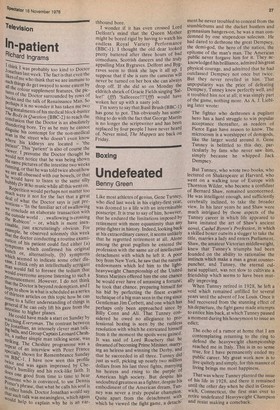Boxing
Undefeated
Benny Green ..M11 Like most athletes of genius, Gene Tunney, who died last week in his eighty-first year, was doomed to a life with an interminable postscript. It is true to say of him, however. that he endured the limitations imposed by retirement with more equanimity than anY prize-fighter in history. Indeed, looking back at his extraordinary career, it seems unlikely that he regretted retirement at all. Alone among the great pugilists he entered the profession with the same air of intellectual detachment with which he left it. A poor boy from New York, he saw that the natural endowments which led him to the light heavyweight Championship of the United States Marines offered him the one chance he would ever have of amassing a fortune; he took that chance, preparing himself for his bid by perfecting the finest evasive technique of a big man seen in the ring since Gentleman Jim Corbett, and one which has perhaps only been approached since by Billy Conn and Ali. That Tunney considered he owed no allegiance to professional boxing is seen by the ruthless resolution with which he extricated himself from it the moment the spoils were gained. It was said of Lord Rosebery that he dreamed of becoming Prime Minister, marrying an heiress and winning the Derby, and that he succeeded in all three. Tunney did just as well, picking up nearly two million dollars from his last three fights, marrying his heiress and rising to the purple of American high society. But despite his undoubted greatness as a fighter, despite his embodiment of the American dream, Tunney was never a truly popular champio.n. Quite apart from the detachment with which he viewed the fight game, a detach ment he never troubled to conceal from the stumblebums and the ducket hustlers and gymnasium hangers-on, he was a man condemned by one stupendous solecism. He had dared to dethrone the great Dempsey, the demi-god, the hero of the nation, the epitome of the man's man. The American public never forgave him for it. They acknowledged his brilliance, admired his great physical courage, and admitted that he had outclassed Dempsey not once but twice. But they never revelled in him. That unpopularity was the price of defeating Dempsey, Tunney knew perfectly well, and it troubled him not at all; it was simply part of the game, nothing more. As A. J. Liebling later wrote: The fighter who dethrones a pugilant hero has a hard struggle to win popular acceptance thereafter, as readers of Pierce Egan have reason to know. The microcosm is a worshipper of demigods, like the larger world around it. Gene Tunney is belittled to this day, particularly by fans who never saw him, simply because he whipped Jack Dempsey.
But Tunney, who wrote two books, who lectured on Shakespeare at Harvard, who went on a walking tour of Europe with Thornton Wilder, who became a confidant of Bernard Shaw, remained unconcerned. He was intelligent enough, and sufficiently cerebrally inclined, to take the broader view. In his later years he and Shaw were much intrigued by those aspects of the Tunney career in which life appeared to have imitated the art of Shaw's ancient novel, Cashel Byron's Profession, in which a skilled boxer outwits a slugger to take the title, marries a lady and enters Parliament. Shaw, the amateur Victorian middleweight, knew that Tunney's triumphs had been founded on the ability to rationalise the instincts which make a man a great counterpuncher, and Tunney, the eternal cultural suppliant, was not slow to cultivate a friendship which seems to have been mutally improving.
When Tunney retired in 1928, he left a void which remained unfilled for several years until the advent of Joe Louis. Once it had recovered from the stunning effect of his departure, the fight game made attempts to entice him back, at which Tunney paused a moment during his honeymoon to issue an edict: The echo of a rumor at home that I am contemplating returning to the ring to defend the heavyweight championship reached me in Italy. This is in no sense true, for I have permanently ended my Public career. My great work now is to live quitely and simply, for this manner of living brings me most happiness.
That was where Tunney planted the issue of his life in 1928, and there it remained until the other day when he died in Greenwich, Connecticut, the first man ever to retire undefeated Heavyweight Champion and resist making a comeback.


































 Previous page
Previous page